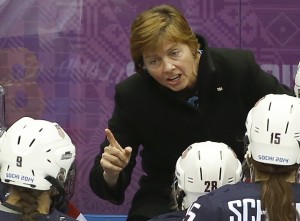Does women’s sports need more women coaches? Kavitha A. Davison writes:
The percentage of women coaching women has steadily dropped over the last four decades, owing to new positions and salaries as well as old stereotypes and biases. A common explanation, still touted by men and women alike, is that female coaches often choose their families over their careers. But that excuse doesn’t fly in the boardroom, and it shouldn’t fly on the bench. Plenty of qualified women want to be coaches, and it’s a problem with the system that they’re not.
Ironically, a major culprit seems to be Title IX, enacted in 1972 to ensure equality for women on campus. According to Women in Intercollegiate Sport, a longitudinal study conducted every two years since 1977 by R. Vivian Acosta and Linda Jean Carpenter, professors emerita at Brooklyn College, more than 90 percent of women’s college teams were coached by women when the law went into force.
Title IX has served female athletes well, helping to raise the level of competition and quality of women’s sports. But as women’s teams got better, coaching them suddenly became more desirable — and lucrative — positions for men. Head coach of a woman’s college team is now a legitimate and financially viable position for a man to hold. While their salaries don’t hold a candle to what their counterparts in men’s basketball get, Division I women’s basketball coaches can make well into the six figures, while a handful of top coaches such as legendary former Tennessee Lady Vols coach Pat Summitt and UConn coach Geno Auriemma can make millions.
With more men increasingly applying for these positions, it’s worth looking at whose doing the hiring. The Acosta/Carpenter study is a treasure trove of data, but some of its most telling sets of numbers are those on college athletic directors. Across Division I, Division II and Division III teams, the percentage of female college coaches of women’s teams is universally higher under female athletic directors.
That fewer female coaches are hired for women’s teams under male athletic directors can largely be explained by networking bias.
Gendered networking by male athletic directors isn’t necessarily intentional. But some recent high-profile personnel decisions seem to reveal the sexism female coaches can face from male administrators.
Then there’s University of Minnesota Duluth women’s hockey coach Shannon Miller, whose contract will not be renewed after March. The Boston Globe’s Shira Springer neatly sums up Miller’s bona fides: “Five NCAA Division 1 titles. Fastest coach to 300 wins in Division 1 history. Career winning percentage near .700. Head coach of the Canadian women’s Olympic team at the 1998 Nagano Games.” With 380 career victories, she’s fourth all-time in Division I women’s hockey history. Yet she’ll be out of a job after 16 seasons because of what athletic director Josh Berlo calls “financial considerations.”
Inevitably, people will ask, why does it matter whether women or men are in these jobs? Because more female athletic directors would help women’s sports be taken more seriously among university administrators, which will only help the growing number of high-quality female athletes. Diversity in coaching hires doesn’t just benefit qualified women who seek equal opportunities, it also helps the players. Much like in business or academia, female athletes need mentors and role models, women who hold positions to which they can aspire and who demonstrate that a career in athletics isn’t just for the men. Women’s college rosters include not just the next Diana Taurasi and Jenny Finch, but also the next Pat Summitt and Becky Hammon.
The good news is that the number of women doing the hiring is on the rise. According to Acosta and Carpenter, the NCAA had 239 female athletic directors in 2014, an 11 percent increase since two years before. And with women such as Griesman and Miller refusing to stay quiet, it continues to shed light on the barriers women face until they’re fairly represented in both the front office and the sideline.

